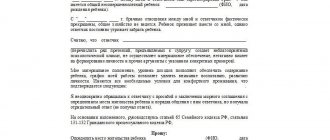1
Payment of alimony provided for by the Family Code of the Russian Federation can be carried out both forcibly - on the basis of a court decision (or order), and within the framework of voluntarily reached agreements between the child’s parents.
Often, mothers with whom their children live after a divorce have a question: how to prove that the father or husband did not pay child support and achieve the recovery of funds retroactively?
How to prove non-payment of child support if you have not filed a lawsuit
When filing a claim for alimony, many plaintiffs think about whether it is necessary to prove in court the fact that the father has not previously helped the child financially?
As a general rule, alimony is awarded from the day the court receives the child’s mother’s application for its assignment. There is no need to prove in court the fact of payment or non-payment of alimony before the date of filing the claim in court.
In order for the court to make a decision (order) to assign alimony, it is necessary:
- Draw up and submit an application to the court. This document must be drawn up in accordance with the requirements established by the Code of Civil Procedure of the Russian Federation;
- Provide the court with evidence of the mother and child living together, as well as confirm the paternity of the defendant (debtor) in the case;
- Attach to the claim other documents required by law, and confirming the information and information specified in the application.
Initial appeal to court
If the mother has not previously applied for judicial protection to withhold alimony payments from the children’s father, then in the claim it is enough to write: “the child’s father does not provide any financial support to the minor, which is why the mother cannot provide him with an adequate standard of living.”
There is no need to confirm the absence of money transfers from the father. If the man fails to prove that money for the children was transferred to the mother, then the claims will be satisfied.
To prove the fact of participation in the life of minors, the father may present the following evidence to the court:
- bank statements about transfers (withdrawals) of money;
- cash receipts confirming the purchase of clothing, medicines, toys for the child;
- testimony of relatives and friends;
- receipts for payment of tutors, sections, clubs and other things.
But courts accept such evidence as additional expenses for children. The fact of payment of alimony payments can only be confirmed by receipts for receiving money, receipts from a bank or mail. The documents must indicate the purpose of the transfer, the name of the recipient and the payment period: “alimony for November 2021 for Anna Kiseleva.”
To assign child support, the mother only needs to confirm the fact of cohabitation with the child with the following documents:
- certificate of family composition according to form No. 9;
- a certificate from a school or kindergarten confirming that the child is studying in the area where the mother lives;
- to confirm good living conditions, the mother can provide the court with an inspection report of the apartment by the guardianship authorities;
- testimony of witnesses.
Collection of alimony for the past period
However, in some situations, a woman will still have to prove in court the fact of non-payment of child support in the past. These are situations when a woman demands in court the collection of alimony for the period preceding the filing of the claim.
It is important to know! Alimony for the period preceding the filing of the claim can only be recovered within the last three years.
In such proceedings, the plaintiffs will need to prove not only the fact of non-payment of child support, but also the fact that she took measures to obtain these funds.
How to get the child's father to pay more?
The alimony holder is not obliged to make payments in excess of the established amount. The amount can only be changed in court.
The reasons for changing the amount of payments may be:
- requiring urgent treatment as a result of deteriorating health conditions;
- the need for sanatorium-resort treatment;
- receipt of paid education by a child;
- registration of disability.
Each case must be considered separately.
Also, the amount of alimony can be increased in the event of a sharp change in the level of inflation, as a result of which the amount received will not be enough for the normal maintenance of minors.
To claim a larger amount, you must file a corresponding claim and provide a complete package of documents, which includes:
- evidence base showing the increase in child costs;
- a court decision on alimony or an agreement between spouses;
- receipt of payment of state duty;
- certificate of divorce and birth of a child;
- copy of the passport.
The more evidence provided, the higher the likelihood of a favorable outcome for the plaintiff.
What measures could these be?
- The plaintiff’s appeal to the defendant with a demand for payment of money for the child. Confirmation of such requests may include inventories of valuable letters, notifications of delivery of correspondence to the addressee, printouts of emails, receipts from the defendant for receipt of documents and other documents;
- A proposal to conclude an agreement on alimony, which can also be confirmed by postal documents, receipts from the defendant and other evidence;
- An appeal to the magistrate's court to issue an order, which was subsequently canceled due to the defendant filing objections within the period established by law;
- Other measures taken by the plaintiff and subsequently confirmed in court.
What to do if the mother wants to collect child support for the entire limitation period
Article 107 of the Family Code makes it possible to collect alimony not only for the current period, but also for the entire past period. This situation becomes possible if the plaintiff proves in court that he did not receive any alimony payments from the defendant. You can receive payments for a maximum of three past years.
Usually, the reason for starting a lawsuit is the insufficient amount of alimony to support a young child. The amount of child benefits is also very small, and if the ex-wife lives in a rented apartment, there will be a catastrophic lack of money for subsistence.
How to prove that child support has not been paid for the last 3 years
When considering such cases, it is important for the plaintiff to prove not so much the fact of non-payment of alimony by the defendant, but rather the fact of taking the necessary measures to collect them.
To confirm the fact of non-payment of alimony, the plaintiff can provide the court with any evidence that she has. So, for example, she can refer to witness testimony, or confirm the lack of receipt of money in bank accounts by providing statements on them.
Since the case will be considered in the presence of representatives of both parties, the court will ask the defendant for confirmation of financial support and payment of child support. And if the defendant is unable to present such documents to the court, the decision will be made in favor of the plaintiff.
Termination of paternity
Depriving the parental rights of a spouse who does not pay child support is a last resort. Along with the satisfaction of the claim for termination of parental obligations in relation to the child, the mutual responsibilities of children to care for their parents also disappear after reaching the age of full legal capacity.
Important! Deprivation of parental rights is not grounds for stopping payments, but such an initiative may help the spouse pay the debt.
Failure to pay alimony under agreement
An alimony agreement is a document voluntarily concluded by the child’s parents in order to determine the amount of alimony, the procedure and methods for its payment, as well as other conditions that the parties consider essential.
Such a document is certified by a notary and is at the same time executory. This means that if the payer fails to fulfill its obligations under it, the case may be transferred to the bailiffs for forced collection of money.
Evidence for the termination of payments for bailiffs can include statements from the bank account of the claimant, to which alimony was previously credited. At the same time, the debtor is not deprived of the right to prove to the bailiffs the fulfillment of his monetary obligation in another way, for example, by transferring cash against a receipt.
Actions
If the father has stopped paying child support benefits or does not want to pay them at all, then the spouse should not remain silent. There is a mechanism for collecting funds from a person recognized as the child’s parent. This can be done in one of the following ways:
- filing a claim to collect the amount owed;
- filing a lawsuit to deprive the evading father of parental rights;
- petition for the application of criminal liability standards.
How to prove that the husband did not pay alimony awarded by the court
As practice shows, in most cases, almost immediately after the court issues a writ of execution ordering child support, a woman applies to the SSP with an application for forced collection. From this moment on, the bailiff assumes all control over the payment of money for child support.
It is he who issues certificates about the presence or absence of alimony debt on the payer, provides information about the amount of the debt, the period for which the debt arose, and also provides other information and information necessary for the consideration of the case in court proceedings.
Such information may be required by the collector to present a demand to the debtor for payment of a penalty, as well as to bring him to other liability provided for by the current legislation of the Russian Federation.
After the court decision
If a decision in the case is made, the court transfers the writ of execution to the bailiff service and subsequently recording the fact of non-payment of alimony payments is the task of the bailiff (Article 12 of the Law “On Bailiffs”).
He is empowered to initiate the process of bringing a willful defaulter to property liability. If the bailiff contacts the police and banking organizations, the debtor’s accounts and property will be seized, and he may be deprived of his driver’s license and the right to travel outside the country. An alimony payer who hides from his ex-wife and the bailiff and does not provide information about his place of work or residential address may be subject to criminal liability.
The Criminal Code of the Russian Federation provides for punishment for malicious failure to pay alimony in the form of correctional labor or imprisonment for up to 1 year or arrest for up to 3 months.
The mother of a child, who for a long time does not receive court-ordered alimony from her ex-husband, has the right to apply to the court with a demand to pay a penalty in the amount of 0.1% of the amount of unpaid alimony for each day of delay. In this case, evidence of non-payment will be a certificate of debt issued by the bailiff.
Father demands child support
Able-bodied children are required by law to financially support their disabled parents.
The exception is when:
- The parent has been deprived of his or her rights to the child;
- The parent himself did not pay child support when the child was unable to work.
Children who did not receive maintenance from their parent at one time have the right to file an objection to their father’s claim for the recovery of alimony from them for his maintenance. Such an objection must be accompanied by all available documents confirming the fact that the father evaded the financial support of his children, including:
- A court decision (order) to collect alimony;
- Certificates from the bailiff regarding the existence of an outstanding debt;
- Witness's testimonies;
- Other evidence admissible by law.
If alimony has already been collected in court
If a court decision in the case of collecting alimony has already been made, the court transfers the writ of execution to the Bailiff Service.
From this moment on, it is the bailiff who is responsible for the forced collection of alimony (according to Article 12 of Federal Law No. 118 “On Bailiffs”):
- controls the fulfillment of alimony obligations in a timely and complete manner,
- records each episode of payment/non-payment of alimony payments;
- calculates alimony arrears;
- sends the writ of execution to the place of work (to the place of receipt of other income - pensions, social benefits);
- seizes and seizes the father's cash savings and property if he has no income.
Also, the bailiff is empowered to hold accountable for failure to comply with a court decision and non-payment of alimony:
- material (a penalty of 0.1% for each day of late payment, compensation for losses incurred due to late fulfillment of obligations);
- administrative (fine, arrest, deprivation of a driver’s license, restriction on the right to travel outside the country);
- criminal (forced and correctional labor, imprisonment for up to 1 year).
An additional measure of influence on the debtor is deprivation of parental rights for non-payment of alimony (according to Article 69 of the RF IC). This measure will make it possible, if not to achieve payment of arrears of alimony, then at least to exclude possible claims from an incapacitated and needy father to an adult child in the future (according to paragraph 1 of Article 71 of the RF IC). In addition, deprivation of parental rights does not relieve the father of the obligation to support the child - alimony is still collected from him.
To apply each of these measures, you need proof of non-payment of alimony.
The bailiff can provide this evidence - he can prepare a certificate about the amount of alimony debt. For more information about calculating alimony arrears and the mother’s interaction with bailiffs, see our articles “How to get alimony arrears out of a debtor” and “How to get alimony arrears paid.”
Thus, the mother does not need to independently collect evidence of non-payment if the forced collection of alimony is carried out by the SSP. The debtor husband will have to prove the payment of alimony (or the presence of valid reasons for non-fulfillment of alimony obligations).
How can a father prove that he paid money for the child?
A man who is obliged to pay for the maintenance of his children must always take care of documents confirming the fact of payment.
If the money was transferred by bank payments, then you can request certified statements from the bank about the payments made. When sending money by mail, the sender also has supporting documents in his hands, which are important to keep carefully.
But, in most cases, problems arise with cash transfers. Rarely do any fathers require a receipt in return. And to prove without receipts the fact of transfer of money “from hand to hand” often becomes simply impossible. An unscrupulous creditor may take advantage of this situation to re-collect funds.
Thus, cash alimony should be transferred to the recipient only in exchange for a written receipt containing the passport data of the recipient and the payer, information about the document on the basis of which the payment is made (agreement or court decision), full name. child, the amount of money transferred, the period for which the payment is made, the date of receipt of the money and the signature of the recipient.
A similar receipt must be issued for each transfer of money. This document does not require notarization, as well as signing it in the presence of witnesses.
Receipt
A receipt is a document that confirms the fact of transfer of cash with a specifically indicated place where the transfer took place, in what volume and to whom and by whom the transfer of money was carried out. It is proof of payment of the amount and is handed over to the payer. There are cases when a receipt will not be recognized as evidence of the validity of the transfer of an amount of money.
Expert opinion Marina Bespalaya In 2011 she graduated from the University of Internal Affairs with a degree in jurisprudence. In 2013, master's degree course, specialty “lawyer”. In 2010-2011, a course at Portland State University (USA) at the Faculty of Criminal Law and Criminology. Since 2011 – practicing lawyer.
According to Art. 808 of the Civil Code of the Russian Federation, receipt - confirmation of the transfer of money or material assets in a certain quantity. Also, in accordance with the Resolution of the Federal Arbitration Court of the North-Western District dated August 11, 2010 on office work No. A56-69901/2009, the receipt is the appropriate evidence to confirm the fact of the transfer of funds and the absence of debt. Therefore, the execution of the document is a guarantee of protecting the interests of participants in possible legal proceedings.
It is worth carefully studying the legislation of the Russian Federation and all the rules and regulations that should be taken into account when paying the amount and receiving a receipt.
A receipt can be used if there is an agreement or there is a court decision to order alimony payments.
Rules for drawing up a receipt:
- Describe accurately all the circumstances under which the transfer of money occurs.
- The receipt must be written by hand.
- It is best to write it in front of witnesses.
- The receipt must include the following information:
- Full name of the recipient and payer;
- Information about the parties;
- Place of transfer of money;
- Exact time of money transfer;
- Date of;
- Information about the child;
- Exact amount;
- Currency;
- Signatures of the parties;
- Signatures of witnesses.








